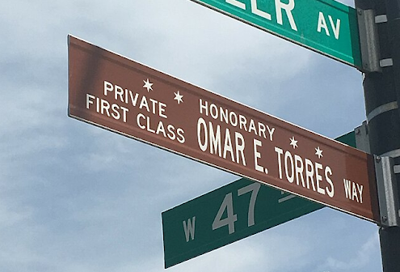In Chicago, history doesn’t always come with fanfare. Sometimes, it is quietly hanging above an intersection on a brown sign with four gold stars and a name most passersby won’t recognize. But for those who do, it’s everything.
Honorary street signs are not a uniquely Chicago tradition, but Chicago stands apart for its well-organized system that turns hundreds of brown signs into a citywide tribute to local history and unsung heroes. They aren’t street renamings in the official sense; mail doesn’t get rerouted, and businesses don’t need to change their addresses. Instead, they serve as symbolic gestures: tributes to the people and organizations who helped shape the city's neighborhoods, culture, and soul.
The honorary sign program began informally in the 1960s and was codified in the 1980s. The goal was simple: to create a way to honor community members without triggering the logistical nightmare of a street name change. In 2017, the city revised the ordinance, limiting each alderman to two honorary signs per year and requiring that honorees be deceased. Each sign is installed for five years, although some remain in place for longer.
According to Linda Zabors, author of the book and website Honorary Chicago and one of the city’s most dedicated documentarians of the program, these signs serve as a kind of grass-roots museum. “Every sign has a heartbeat,” Zabors told the Chicago Tribune. Her research reveals an often-overlooked archive of civic memory, a record of who mattered and to whom.
But just mattering a little doesn’t earn a place in Chicago’s honorary skyline. The city requires that honorees have made “extraordinary contributions” to public life, whether through education, activism, art, public service, or community engagement. People must be deceased, and the location must have a meaningful connection to the honoree’s life or work.
Read more at Chicago Star
- Playground palooza! Parks and playgrounds kids will go nuts for
- River floats near Chicago to be lazy and go tubing crazy
- Universal Horror brings monsters, new life to Goose Island
- What forgotten shipwrecks are beneath Lake Michigan?
While a few names belong to household figures, such as Oprah Winfrey; Chicago’s first African-American mayor, Harold Washington; and jazz legend Muddy Waters, the majority honor local legends: neighborhood pastors, public school teachers, youth mentors, labor organizers, and small business owners who have made an outsized impact on their communities.
Clergy remain the most frequently honored group, followed by musicians, educators, and activists. These signs reflect the city’s diverse values, honoring both high-profile figures and hometown heroes who might otherwise be forgotten.
To remember a local hero, anyone can begin the process, but proposals must go through an alderman’s office. The application includes a biography, a justification for the honor, a proposed two-block stretchof a particular street, and supporting documentation from community members. If the alderman supports it, the proposal moves through committee review and a full City Council vote.
Once approved, the Chicago Department of Transportation installs two signs, one at each end of the designated street segment. Though they blend into the city’s backdrop, they carry the weight of collective memory.
Honorary street signs are quiet, but they are powerful. They represent a form of civic storytelling that is both democratic and deeply personal. They acknowledge that history isn’t just made in city halls or stadiums; it’s made in classrooms, union halls, church basements, and corner stores.
In a city layered with stories, Chicago’s brown signs don’t just honor the past. They keep it visible. And in doing so, they invite everyone to look up and remember.







(0) comments
Welcome to the discussion.
Log In
Keep it Clean. Please avoid obscene, vulgar, lewd, racist or sexually-oriented language.
PLEASE TURN OFF YOUR CAPS LOCK.
Don't Threaten. Threats of harming another person will not be tolerated.
Be Truthful. Don't knowingly lie about anyone or anything.
Be Nice. No racism, sexism or any sort of -ism that is degrading to another person.
Be Proactive. Use the 'Report' link on each comment to let us know of abusive posts.
Share with Us. We'd love to hear eyewitness accounts, the history behind an article.